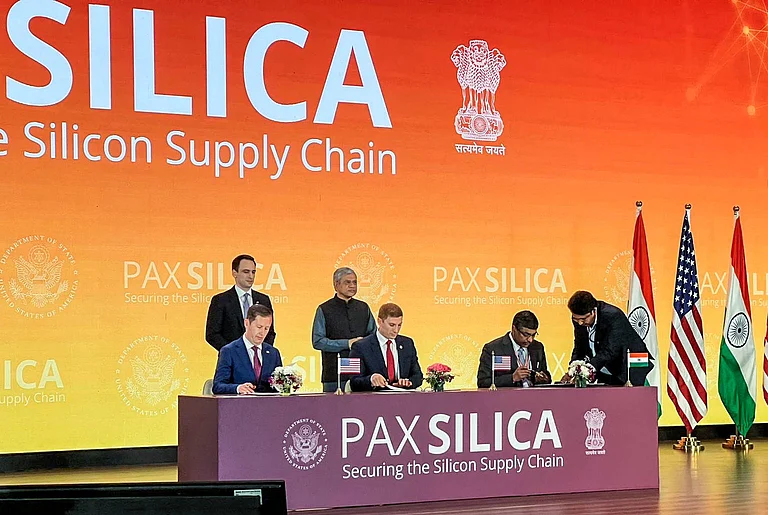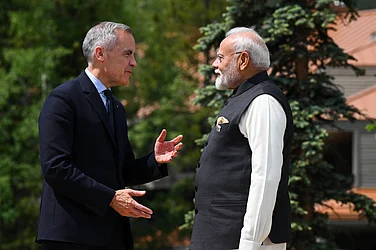Prime Minister Narendra Modi fetched another semiconductor project for India during his ongoing foreign trip - a three-day United States (US) visit that started on Saturday to attend the Quad summit and address a key conclave at the United Nations General Assembly (UNGA).
PM Modi held separate bilateral meetings with US President Joe Biden and other world leaders on the margins of the Quad summit in Wilmington, Delaware, and the 'Summit of the Future' at the UN General Assembly in New York. The prime minister's other engagements included joining an Indian diaspora event at Long Island and participating in a round table with CEOs of American firms working on cutting-edge technologies such as AI, quantum computing and semiconductors.
Semiconductor deals have been a common occurrence in PM Modi's recent foreign trips, including his recent Singapore visit where he inked a Memorandum of Understanding (MoU) that focussed on semiconductors digital technologies, skill development and healthcare.
What makes semiconductors so important that they have become a regular part of Indian PM agendas during his trips abroad?
What Are Semiconductors
Semiconductors, also referred to as integrated circuits (ICs) or microchips, are a key component in electronic devices and are made from pure elements, typically silicon or germanium, or compounds such as gallium arsenide.
As a life without smartphones, televisions, laptops, computers, video games or TVs, computers, video games, or advanced is unimaginable, semiconductors become important due to their role in the fabrication of electronic devices.
The 'Chip War': Semiconductors In Geopolitics
With the present times heavily driven by technology, and the exponential growth of Artificial Intelligence (AI), semiconductors have become as important as oil when it comes to geopolitics.
According to a report in worldpopulationreview.com, the top five semiconductor-producing countries are Taiwan, South Korea, Japan, the United States and China. Two of these five countries - the US and China - are not the best of friends. Meanwhile, Taiwan, which China claims is part of its territory, produces singlehandedly manufactures roughly 50 per cent of the world's semiconductors.
Even though the US just 12 per cent of the world's total semiconductor manufacturing capacity in 2021, US-based companies held approximately 46.3 percent of the total semiconductor market share due to both the dollar value of imported US semiconductors and also due to many US-based companies own and operate semiconductor fabrication plants in other countries, such as Japan.
China is the world's largest market for semiconductors and produces cheaper chips, courtesy: its massive manufacturing sector. Moreover, the Chinese government aims to expand the country's manufacturing capabilities to the point that it becomes self-reliant, producing the required amount of semiconductors domestically, with no need for imports. China is expected to produce up to 25 per cent of the world's semiconductors by the year 2030, according to the report.
Called the 'chip war', China's possible emergence as a semiconductor giant, which the country already is to some extent, raises concerns over economic and security dominance with the possibility of China's self-sufficiency in semiconductor design and manufacturing increasing the risk of vulnerabilities in Chinese-made chips. Analysts believe these vulnerabilities could be exploited to conduct cyber espionage or compromise critical infrastructure.
As mentioned in multiple reports, for US, national security becomes a concern as most cheap chips come from China and a significant percentage of high-quality ones come from Taiwan, which has deterred China from using force to attack the island. In the farfetched scenario of a war breaking out between China and Taiwan, the US could be in trouble as its firms depend on sources in Taiwan and South Korea for production of their most sophisticated designs, according to Centre For Strategic & International Studies.
"Notwithstanding Taiwan’s close alignment with the United States and its allies and China’s lagging technological position in microelectronics, the degree of global dependence on semiconductor production facilities in Taiwan for leading edge chips is a major strategic vulnerability. Geopolitical risks are often, and rightly, mentioned in this context. However, natural disasters such as earthquakes, droughts, or pandemics, all of which have occurred in the recent past, could shut down Taiwan’s semiconductor production for a protracted period," the CSIS report says.
"Also, China might eventually find a way to coerce TSMC or the government of Taiwan into supporting its development of AI chips or supplying those chips to China. In an extreme case, China could take a variety of military actions, which would disrupt production and delivery of advanced chips," the report adds.
Positioning India
India has set a 'five-year target' to cut the dominance of Taiwan, South Korea and China in chip manufacturing. IT and Telecom Minister Ashwini Vaishnaw said in an interview with news agency PTI earlier this year that the semiconductor plans will make India self-reliant, trigger a multiplier effect on the economy and various industries, create job and spur livelihoods.
India has been in engaged in prolonged border faceoff with China along the Line of Actual Control (LAC), making the concern over national security a key foreign policy factor to cater to for the Indian government. Dependence on China for semiconductors, which are used in almost all electronic devices and also a crucial part of India's technology-driven security aspects of India, makes the country vulnerable to multiple threats.
India’s rapidly increasing consumer electronics market and two live borders face a host of threats, placing a premium on the development of a semiconductor and display manufacturing ecosystem within the country, an Institute for Defence Studies and Analyses (IDSA) report by Lieutenant Colonel Akshat Upadhyay in says, adding that this is why a number of MoUs have been signed between Indian and international firms.
During PM Modi's ongoing US trip, an ambitious India-US joint project was announced following talks between Prime Minister Narendra Modi and US President Joe Biden in Wilmington on Saturday.
Under this project in collaboration with the US, India will get its first-ever national security semiconductor fabrication plant that will produce chips for use in military hardware in both the countries as well as in critical telecommunication networks and electronics.
The project will be enabled by support from the India Semiconductor Mission and will be part of a strategic technology partnership among Bharat Semi, 3rdiTech, and the US Space Force. It will not only become India's first, but one of the world's first multi-material fab for national security, people aware of the matter said.
It is the first time that the US military has agreed to do a partnership for these high-value technologies with India and it is a watershed moment as it is as significant as the civil nuclear deal, they said.
In another recent boost for India's semiconductor plan, the Yamuna Expressway Industrial Development Authority (YEIDA) of Uttar Pradesh earlier this month allocated approximately thirty acres of land to the joint venture between Taiwanese company Foxconn and HCL Group, an IT services major, for the establishment of a semiconductor outsourced assembly and testing (OSAT) unit.
During his PM Modi's meet with Singaporean Prime Minister Lawrence Wong earlier this month in Singapore, the two leaders underscored that the cooperation under advanced manufacturing, connectivity, digitalisation, healthcare and medicine, skills development and sustainability pillars, particularly in the areas of semiconductors, open a new chapter in bilateral relations making the ties between the two countries "future oriented."
Both leaders witnessed exchange of key MoUs for cooperation in semiconductors, digital technologies, skill development and healthcare.

























